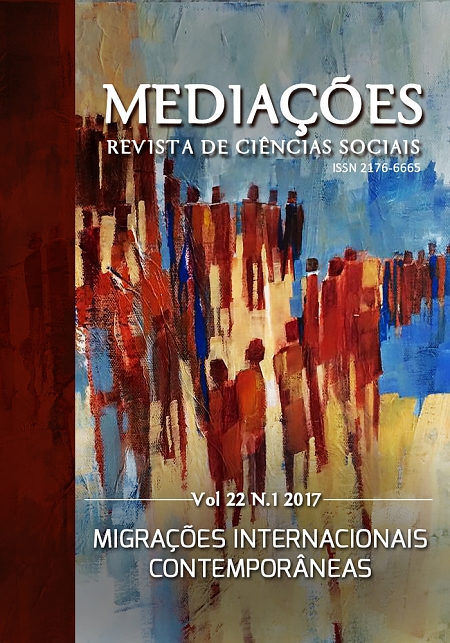The "basic good" as a substantive principle of suspicious action: the tension saving in bus travel in the city of Rio de Janeiro
DOI:
https://doi.org/10.5433/2176-6665.2017v22n1p367Keywords:
Distrust, Urban Violence, Pragmatism, BusAbstract
In this article is analyzed how distrust practices mobilized in Rio de Janeiro by paying passengers and urban bus employees, due to different "dangers" projected by them regarding the city, have as a substantive principle a expectative of damage related to the physical and patrimonial integrity, elements that compose what is proposed as "primary good". Exploring this kind of good, it is likewise worked how distrust allows an economy regarding the energy expenditure that would be mobilized along with the tension of the concretizing "dangers" then avoided or removed. Therefore, this work intends to comprehend the elements that allows the execution of distrust actions in the city of Rio de Janeiro.Downloads
References
BOLTANSKI, Luc [e] THÉVENOT, Laurent. On Justification: Economies of Worth. Princeton University Press, 2006[1991].
BOLTANSKI, Luc . The Sociology of Critical Capacity. European Journal of Social Theory, v. 2, n. 3, p. 359-377, 1999.
CAIAFA, Janice. Jornadas urbanas: Exclusão, trabalho e subjetividade nas viagens de ônibus na cidade do Rio de Janeiro. Rio de Janeiro: Editora FGV, 2002.
CHATEAURAYNAUD, Francis. A prova do tangível: Experiências de investigação e o surgimento da prova. SocioPhilo, Iesp/Uerj, 2012.
COLLINS, Randall. Violence: A Microsociological Theory. Princeton/Oxford, Princeton University Press, 2008.
DAS, Veena. Life and Words. Violence and the descent into the ordinary. University of California Press, Berkeley/Los Angeles/London, 2007.
GIDDENS, Anthony. As consequências da modernidade. Tradução: Raul Fiker. São Paulo: Editora UNESP, 1991.
GARFINKEL, Harold. Studies in Ethnomethodology. Englewood Cliffs (EUA), Prentice Hall, 1967.
GOFFMAN, Erving. Ritual de interação: Ensaios sobre o comportamento face a face. Petrópolis: Vozes, 2011[1967].
FREIRE, Jussara. Agir no regime de desumanização: Esboço de um modelo para análise da sociabilidade urbana na cidade do Rio de Janeiro. Dilemas: Revista de Estudos de Conflito e Controle Social, Rio de Janeiro, v. 3, n. 10, p. 119-142, 2010.
HARDIN, Russel. Trutworthiness. Ethics, v. 107, n. 1, p. 26-42, 1996.
HIRSCHMAN, Albert. Saída, voz e lealdade. São Paulo: Perspectiva, 1973
KATZ, Jack. Seductions of Crime: Moral and Sensual Attraction in Doing Evil. Nova York: Basic Books, 1988.
LINHARDT, Dominique. L'économie du soupçon: Une Contribution pragmatique à la sociologie de la menace. Genèses, n. 44, p. 76-98, 2001.
LUHMANN, Niklas. Trust and Power, Nova York: John Wiley & Sons, 1979
MACHADO DA SILVA, Luiz Antônio. Violência urbana: Representação de uma ordem social. In: NASCIMENTO, Elimar Pinheiro [e] Barreira, Irlys (orgs). Brasil urbano: Cenário da ordem e da desordem. Rio de Janeiro: Notrya, p. 131-142, 1993.
MISSE, Michel. Malandros, marginais e vagabundos: A acumulação social da violência no Rio de Janeiro. 1999. Tese (Doutorado em Sociologia) - Universidade Cândido Mendes, Rio de Janeiro, 1999.
PORTO, Maria Stela Grossi. Crenças, valores e representações sociais da violência. Sociologias. UFRGS Impresso, v. 8, n. 16, p. 250-273, 2006.
SHELLER, Mimi [e] URRY, John. The new mobilities paradigm. Environment and Planning A, v. 38, p. 207-226, 2006.
SZTOMPKA, Piotr. Trust: A Cultural Resource. In: SKAPSKA, Grazina; ORLA-BURKOWSKA, Annamaria; KOWALSKI, Krzysztof (org). The Moral Fabric In Contemporary Societies. Leida (Holanda), Brill, 2003.
SZTOMPKA, Piotr. Trust: A Sociological Theory. Cambrigde (RU): Cambrigde University Press. 2006.
TALONE, Vittorio. Confiança e desconfiança como dispositivos morais situacionais em trânsito: um estudo em viagens de ônibus na cidade do Rio de Janeiro. 2015. Dissertação (Mestrado em Sociologia) - Universidade Federal do Rio de Janeiro, Rio de Janeiro, 2015.
WEBER, Max. A "objetividade" do conhecimento na ciência social e na ciência política. In: WEBER, Max. Metodologia das ciências sociais. São Paulo: Cortez, 2001[1904].
WEBER, Max. Metodologia das ciências sociais, parte I. São Paulo: Cortez, 1993
WERNECK, Alexandre. A desculpa: As circunstâncias e a moral das relações sociais. Rio de Janeiro: Civilização Brasileira. 2012.
WERNECK, Alexandre. Teoria da rotulação. In: LIMA, Renato Sérgio de; RATTON, José Luiz ; AZEVEDO, Rodrigo (orgs). Crime, polícia e justiça no Brasil. São Paulo: Contexto, p. 105-116, 2014.
WERNECK, Alexandre. Sociologia da moral, agência e criatividade. In: WERNECK, Alexandre ; CARDOSO de Oliveira, Luís Roberto (orgs). Pensando bem: Estudos de sociologia e antropologia damoral. Rio de Janeiro: Casa da Palavra, p. 114-138, 2014.
WERNECK, Alexandre. Dar uma zoada, botar a maior marra: Dispositivos morais de jocosidade como formas de efetivação em situações de crítica. Dados: Revista de Ciências Sociais, v. 58, n. 1, p. 221-287, 2015.
WRIGHT Mills, Charles. Situated Actions and vocabularies of motive. American Sociological Review, v. 5, n. 6, p. 904-913, 1940.
Downloads
Published
How to Cite
Issue
Section
License
Copyright (c) 2017 Vittorio Talone

This work is licensed under a Creative Commons Attribution 4.0 International License.
Copyright on articles published in Mediações belongs to the author(s): in the case of partial or entire republication of the original publication, we ask author(s) to indicate the original publication in the periodical.
Mediações uses the Creative Commons Attribution 4.0 International license, which allows Open Access, enabling any user to read, download, copy and disseminate its content so long as adequately referenced.
The opinions expressed by the author(s) are their sole responsibility.
































